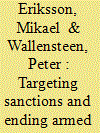|
|
|
Sort Order |
|
|
|
Items / Page
|
|
|
|
|
|
|
| Srl | Item |
| 1 |
ID:
189379


|
|
|
|
|
| Summary/Abstract |
Despite a growing interest in posthuman theory within political geography over the last two decades, the sub-disciplinary focus of critical border studies has seen a slower engagement with more-than-human entanglements. In this introductory paper to the special section, we ask whether the militarisation of borderlands, increasing surveillance of mobility, growing violence against refugees and asylum seekers, pandemic bordering, and mass displacement can be fully grasped through a singular focus upon the agency of the human subject. In addressing these questions, we challenge what we see as an anthropocentric preoccupation of existing scholarship in critical border studies and argue that the border is a constantly moving space that is created, maintained and/or dismantled by the entanglements of human and non-human lives and things. Our aim in bringing posthuman conversations into critical border studies is to explore different methods and questions that challenge binary constructions in our understandings of borders. In our response to these challenges, within this opening piece, we map three areas of debate: rethinking the heterogeneity of more-than-human borders; studying the agency of ‘things’ of the border; and finally, considering dehumanising practices of border politics. We suggest that the scholarship on more-than-human borders can be seen as a ‘minor literature’ that calls for a genuine realisation of forgotten and suppressed languages, voices, and knowledges.
|
|
|
|
|
|
|
|
|
|
|
|
|
|
|
|
| 2 |
ID:
142436


|
|
|
|
|
| Summary/Abstract |
Capitalizing on the newly released dataset on United Nations sanctions and armed conflicts, this article raises the question whether targeted sanctions have an impact on the dynamics of armed conflicts, and, if they do, in what way. To answer this question the authors correlate UN sanctions policies to measures related to armed conflict in the period 1991–2013. This is done by systematizing and analysing data produced by the UN Targeted Sanctions Consortium (TSC) and the Uppsala Conflict Data Program (UCDP). It is a first attempt to deal with questions such as the relationship between UN targeted sanctions and armed conflict type, conflict termination and conflict outcome (victory, peace agreements, etc.). The article demonstrates that there are several instances where the UN has decided not to impose targeted sanctions, although the conditions were similar to those cases that saw such action. There is a tendency to use targeted sanctions only in certain types of conflicts. The authors suggest that this is partly rooted in the structure of the UN as an inter-state organization. Thus, sanctions are more of a political instrument than has perhaps been recognized in sanctions research to date.
|
|
|
|
|
|
|
|
|
|
|
|
|
|
|
|
|
|
|
|
|